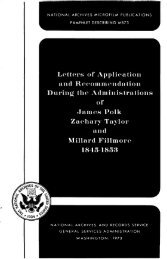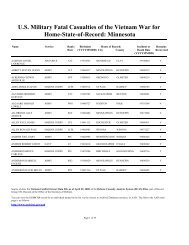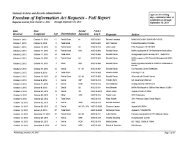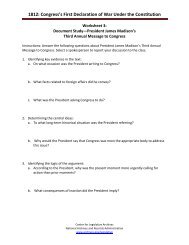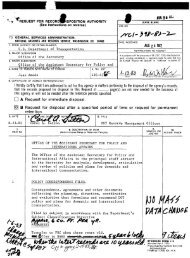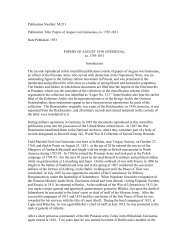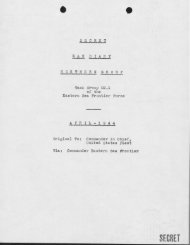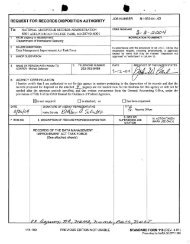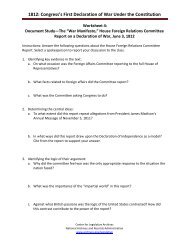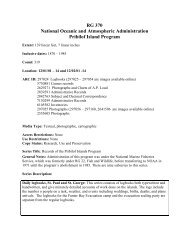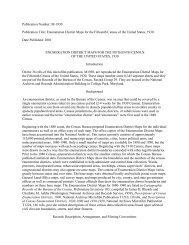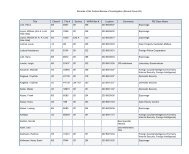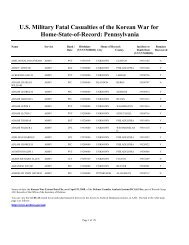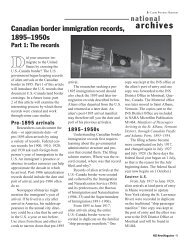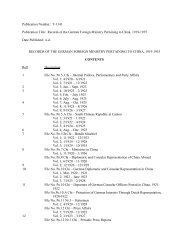HITLER'S SHADOW - National Archives and Records Administration
HITLER'S SHADOW - National Archives and Records Administration
HITLER'S SHADOW - National Archives and Records Administration
Create successful ePaper yourself
Turn your PDF publications into a flip-book with our unique Google optimized e-Paper software.
Detachment’s comm<strong>and</strong>ing officer, suggests that senior CIC officers took a<br />
different tack. As Erskine explained later to his superiors at OMGUS,<br />
The [Fischer] net was … neutralized <strong>and</strong> eventually disb<strong>and</strong>ed when<br />
it became unwieldy <strong>and</strong> began to exhibit a lack of requisite security.<br />
Meanwhile, Fischer became a definite security problem for this organization.<br />
It was felt that he would require an extensive ‘debriefing’ period before he<br />
could be safely dropped by this organization. The debriefing process was<br />
well underway at the time the Subject was brought to trial <strong>and</strong> convicted.<br />
The conviction, in actuality, gave this organization a ‘stated’ reason to more<br />
speedily terminate its relationship with Subject. 58<br />
In short, the CIC did not protect Fischer <strong>and</strong> Mahler. It allowed the trial to go<br />
forward as a way to neutralize Fischer, perhaps in the expectation that neither<br />
man would reveal his sources to the German authorities.<br />
Fischer <strong>and</strong> Mahler stood trial in Bavarian State Court in Munich from<br />
December 19–22, 1949, for their excesses during their Gestapo service. Mahler’s<br />
service in Einsatzgruppe B never came up in this trial. There were originally 14<br />
complaints against Fischer <strong>and</strong> 12 against Mahler, most centering on beatings<br />
of Communists during interrogations. For many of the accusers, the trial was<br />
political from the start. “Now we’ll at least have two of this gang,” said one<br />
witness. 59 Several witnesses out of more than 40 that were called tempered their<br />
testimonies once warned of the penalty for perjury. Other witness statements<br />
were based on hearsay. Yet Fischer was still found guilty of beating prisoners <strong>and</strong><br />
forcing confessions in six cases (two confessions led to executions). Mahler was<br />
found guilty of three beatings <strong>and</strong> one confession forced through threats.<br />
Their sentences were relatively mild. Both Gestapo functionaries broke German<br />
laws governing police interrogations that were still technically valid under the Nazis.<br />
But the court gave allowance for the fact that Fischer <strong>and</strong> Mahler, as police officers,<br />
were trying to uncover cases of high treason in wartime. Fischer received a five-year<br />
prison sentence <strong>and</strong> Mahler a sentence of four years, but each sentence was reduced<br />
by 18 months, owing to time already served in Allied enclosures. 60<br />
The CIC was philosophical. Though some evidence was unreliable <strong>and</strong><br />
perhaps even perjured, there was also little doubt that the defendants “did strike<br />
<strong>and</strong> mistreat some prisoners.” “Considering the pressure on the judge [<strong>and</strong>] the<br />
New Materials on Former Gestapo Officers | 47



